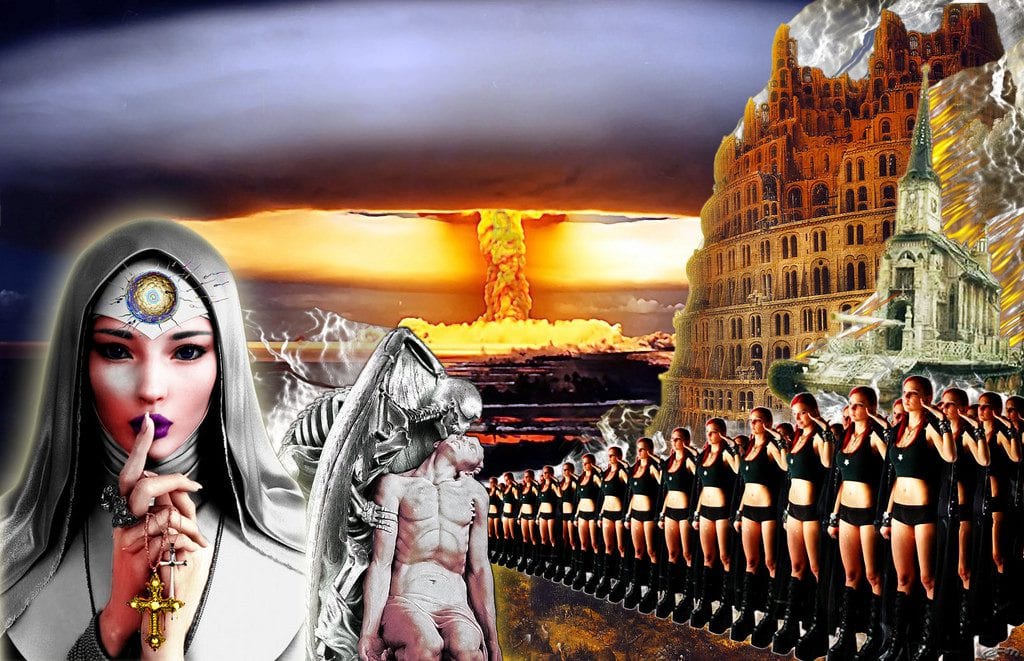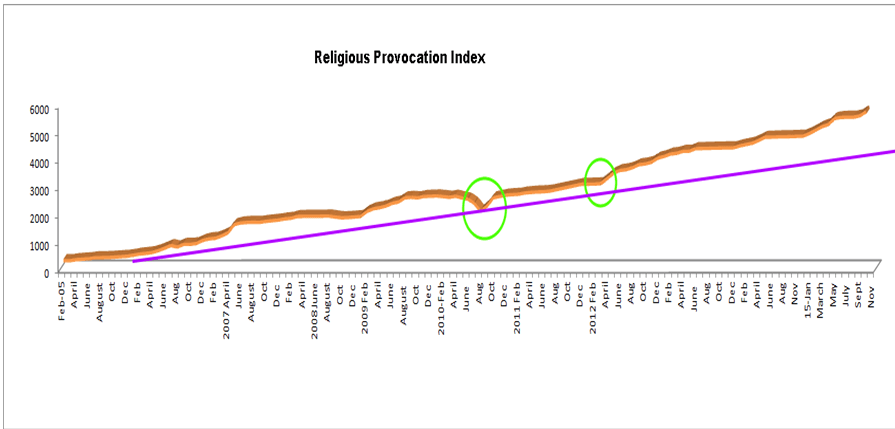Unveiling the Shadows: Contemporary Realities of Religious Persecution
Updated Dec 27, 2023
The term “religious persecution” refers to the harsh reality of escalating hostility towards religious diversity and the freedom to practice one’s faith. The custom index tracking religious intolerance and violent behaviour has surged from 300-501 in 2005-2006 to a staggering 5750 today, indicating a more than tenfold increase.
A significant example is the persecution of Christians, especially notable in countries like China, India, and Nigeria. In China, the government’s crackdown on religious institutions has led to church closures and the imprisonment of pastors and followers. India is witnessing a rise in militant Hinduism, with Christians frequently facing violent attacks. In Nigeria, groups like Boko Haram and Fulani militias engage in brutal assaults against Christian communities.
These trends represent more than numbers; they reflect people living in constant fear, persecuted for their faith. The growing religious intolerance not only endangers individuals and communities directly affected but also undermines universal human rights and religious freedom.
Beyond the immediate impact, religious intolerance fuels social division, conflict, and violence, hindering social cohesion, disrupting peace, and acting as a significant barrier to development. International organizations, governments, and civil societies must unite against these rising trends and uphold religious freedom and human rights worldwide.
Unmasking the Shadows: Religious Hatred and the Menacing Surge of Intolerance
The issue of contemporary religious persecution extends beyond direct violence against individuals based on their faith. It encompasses a broader societal impact, revealing itself in conflicts with a spiritual dimension. Particularly prevalent in diverse societies, religious intolerance exploits differences in beliefs to sow discord and violence.
Surprisingly, religious violence isn’t confined to religiously diverse settings. Even in homogeneous countries like Somalia, radical groups can instigate significant instability, leveraging religious sentiments to justify violence and recruit followers. This cycle of violence and intolerance is challenging to break.
The psychological toll of such conflicts is profound. Individuals in these societies often suffer psychological trauma and PTSD, influenced by individual differences, cultural context, religious beliefs, socioeconomic status, and political affiliations.
Religious intolerance and violence breed a culture of fear and hatred, perpetuated through misinformation and propaganda. In the digital age, where information spreads rapidly, this can exacerbate religious conflicts.
Additionally, religious intolerance contributes to social injustice, leading to the marginalization of certain groups, restricting their access to resources, and infringing on their rights. This fuels social tensions and conflicts, creating a challenging cycle to overcome.
Religious Hostility: A Global Trend with No End in Sight
The alarming trend of religious hostility is not confined to a few countries or regions; it is a global phenomenon that continues to rise. In 2012, a survey of 198 countries and territories revealed that social hostility, such as attacks on minority faiths or pressure to conform to certain norms, was intense in one-third of the surveyed regions. This hostility can manifest in various forms, including violence or the threat of violence to enforce religious norms, assaults or displacement in retaliation for religious activities, and harassment for violating spiritual dress codes.
Religious-related terrorism and sectarian violence occurred in one-fifth of those countries in the same year, indicating a significant prevalence of violent conflict with a religious dimension. This violence often stems from radical groups that exploit religious sentiments to justify their actions and gain followers, leading to significant instability even in religiously homogeneous countries.
Moreover, states imposed legal limits on worship, preaching, or religious wear in almost 30 per cent of the surveyed countries and territories. These restrictions can range from government limits on religious activities to discriminatory practices that enforce racial and xenophobic boundaries around certain religious groups Such restrictions not only infringe on the rights to freedom of religion and expression, but they also contribute to social injustice and inequality, further fueling social tensions and conflicts.
The rise of religious hostility is also exacerbated by the spread of misinformation and propaganda, particularly in the digital age. This can lead to a culture of fear and hatred, further fueling the cycle of violence and intolerance. Moreover, the prevalence of trolling and belligerent factionalism in public debate can also contribute to the spread of religious hostility, particularly against ethnic, spiritual, and sexual minorities.
The Rising Tide: Urgent Realities of Escalating Religious Persecution
The escalating crisis of religious persecution demands immediate global attention, as highlighted by Open Doors, a Christian organization monitoring persecution worldwide. Shockingly, the number of Christians killed for their faith doubled to 2,123 globally in a single year, with Syria alone surpassing the entire global total in 2012.
This surge in violence against Christians serves as a stark reminder of contemporary religious persecution’s harsh realities. It extends beyond direct violence to encompass broader societal implications, including the psychological impact of religious conflicts, combating the culture of fear and hatred, and promoting social justice and equality.
Syria stands out as an alarming case, embroiled in civil war since 2011, providing fertile ground for religious persecution. Various factions, including the government, rebel groups, and extremists, are implicated in severe human rights abuses.
Yet, the crisis extends beyond Syria and Christians. Globally, individuals of various faiths face discrimination, violence, and persecution, including Muslims, Jews, Hindus, Buddhists, and others targeted due to their religious beliefs.
Addressing the rising tide of religious persecution requires a comprehensive approach. It’s not just about countering direct violence but also tackling the broader societal implications of religious intolerance. This involves combating the culture of fear and hatred, promoting social justice and equality, and upholding the fundamental rights to freedom of religion and expression.
Unveiling the Shadows: The Global Tapestry of Contemporary Religious Persecution
The unseen faces of religious persecution today form a diverse and global tableau. In Syria, Christians caught in the crossfire of civil war; in Myanmar, Rohingya Muslims facing systemic violence; in Europe, Jews contending with a resurgence of anti-Semitism; and in Iran, Baha’is enduring discrimination and oppression.
These marginalized individuals, often voiceless, bear the weight of escalating religious intolerance and violence. Their untold stories underscore the harsh realities of contemporary religious persecution, emphasizing that for many worldwide, the fundamental human right of religious freedom remains elusive.
The plight of Christians in war-torn Syria is particularly alarming, as they become targets of violence, forced displacement, and mass executions. All sides, be it the government, rebel groups, or extremists, are implicated in severe human rights abuses, including religious persecution.
Myanmar presents a dire situation for Rohingya Muslims, labelled by the United Nations as the “most persecuted minority in the world.” Systemic violence, forced displacement, and denial of fundamental human rights occur under the pretext of national security and religious homogeneity.
In Europe, a resurgence of anti-Semitism fuels hate crimes, vandalism, and discrimination against Jews. Far-right political movements, misinformation, and the scapegoating of Jews for societal issues fuel this resurgence.
Iran’s Baha’i community faces institutionalized discrimination, including denial of civil rights, restricted access to education, and arbitrary arrests due to their unrecognized faith.
The stories of these unseen faces of religious persecution compel global action. Condemnation alone is insufficient; concrete measures are imperative to promote religious freedom, tolerance, and respect for all beliefs. Addressing root causes such as ignorance, fear, and misinformation is crucial, fostering a culture of understanding and acceptance.
Revealing the Crucible: Alarming Trends in Global Religious Persecution
In the unfolding narrative of global religious persecution, a stark warning resonates from an international Christian organization. Release International, a respected U.K.-based charity supporting persecuted Christians worldwide, aligns its concerns with a strategic ally, Voice of the Martyrs. The alarm is directed towards the United States, urging more significant intervention.
Release International highlights a concerning surge in persecution, particularly in China, India, and Nigeria. Andrew Boyd, the articulate spokesperson, emphasizes, “These nations have long been marked on the map of concern, but what we’re witnessing now is a noticeable uptick, a disconcerting surge in persecution.”
Boyd sheds light on the diverse manifestations of persecution: “Release has been steadfast in this mission for five decades. Persecution is undeniably on the rise, displaying alarming diversity. From militant Islam in Nigeria to communism in China, and from militant Hinduism in India to the peculiar blend of communism and Emperor worship in North Korea—there’s an escalating intolerance manifesting in violence. We gather this insight through reports from our dedicated partners on the ground. Full Story
Unmasking Shadows: Understanding the Surge of Religious Intolerance and Conflict
Matthias Basedau’s research illuminates the escalating presence of conflicts with a religious dimension globally, particularly in sub-Saharan Africa. Like many others, this region grapples with vulnerability to conflicts, often stemming from weak state institutions. The study underscores that religious conflicts frequently spill over from North Africa and the Middle East, either directly or indirectly, through the propagation of more extremist interpretations of Islam from countries like Libya or Algeria.
Crucially, Basedau emphasizes that while religion is a significant factor in these conflicts, they are multi-faceted also driven by ethnic tensions, power struggles, and resource disputes. No conflict is solely rooted in religion.
The study identifies countries with diverse populations and religious communities as susceptible to religious conflicts. Even in religiously homogeneous countries like Somalia, experiencing significant instability, religious violence is evident due to the direct influence of radical groups in North Africa, such as Al-Qaeda in the Islamic Maghreb (AQIM) or Islamic State offshoots. These groups actively support rebel movements in Mali, Nigeria, and Somalia, with indirect influences from other Middle Eastern states. Full Story
Religious Hostility Unveiled: A Global Challenge Showing No Signs of Abating
The alarming trend of religious hostility has reached an intense level, affecting one-third of the 198 countries and territories surveyed in 2012, particularly in the Middle East and North Africa, as revealed in a recent report by Pew. Social hostility, ranging from attacks on minority faiths to pressure to conform to certain norms, has become a prevalent issue.
The report highlights that religious-related terrorism and sectarian violence were reported in one-fifth of the surveyed countries in the same year. Additionally, legal limitations on worship, preaching, or religious attire were imposed in almost 30 per cent of these nations.
Pew’s report notes a concerning increase in religious persecution across every central region worldwide, except the Americas, based on data dating back to 2007. The study covers various faiths, including Christians, Muslims, Jews, and an “other” category comprising Sikhs, Baha’is, and atheists. However, the report does not provide a specific reason for the rise in hostility.
Data from the report indicates that Hindus, Buddhists, and followers of folk religions experienced lower levels of hostility, with little change in the past six years. Countries with significant populations, such as China, Indonesia, Russia, and Egypt, have imposed official or informal restrictions on 76% of the global population’s faith.
A recent report by the Christian group Open Doors further underscores the severity of the situation, revealing a doubling of documented cases of Christians killed for their faith to 2,123 worldwide. Syria alone accounted for more cases than the entire global total in 2012, emphasizing the urgent need for collective efforts to address this escalating global challenge. Full Story
Conclusion: Shining a Light on Religious Persecution Today
The shadows of religious persecution are indeed expanding, casting a longer and darker veil across the globe. The alarming surge in the persecution of Christians, the increasing prevalence of conflicts with a religious dimension, and the untold stories of the marginalized and voiceless are stark reminders of the pressing realities of **religious persecution today**.
The world’s landscape is stained with the footprints of religious intolerance, from Syria to Myanmar, from Europe to Iran. These issues are disturbing and pose a significant challenge that demands immediate attention and a comprehensive, nuanced approach.
However, amidst this grim reality, there lies an opportunity for change. By shining a light on these issues, we can bring them out of the shadows and into the global discourse. Awareness is the first step towards addressing these problems. It can fuel the global call to action and mobilize efforts to counter religious persecution.
We must foster a culture that promotes religious freedom, tolerance, and respect for all beliefs. This includes initiatives to address the root causes of religious intolerance, such as ignorance, fear, and misinformation, and efforts to uphold the right to freedom of religion and expression. Legal frameworks must be strengthened to protect religious rights, and educational programs should be implemented to promote understanding and acceptance of different faiths.
Moreover, it is crucial to support those affected by religious persecution, including psychological support, legal assistance, and advocacy. The international community should also take coordinated action to hold perpetrators of religious persecution accountable and to promote peace and reconciliation in conflict-ridden societies.
In conclusion, the realities of religious persecution today are both disturbing and challenging. But by focusing on these issues and taking decisive action to address them, we can work towards a world where everyone can freely practice their faith without fear of persecution. It’s a daunting task, but with a concerted global effort, it’s a challenge we can overcome.
Journey to Unexplored Insights
the Level Of Investments In A Markets Indicates












